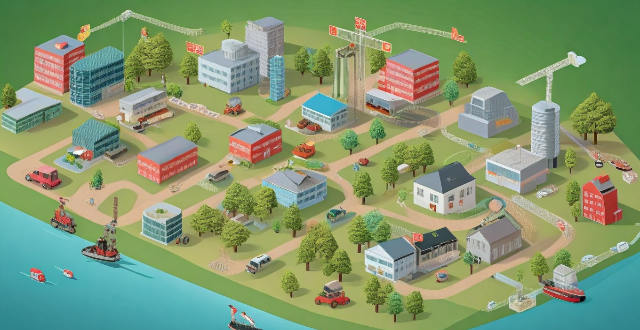Balancing economic development with climate action and human rights protection requires prioritizing sustainable development, integrating climate action into economic planning, protecting human rights, and collaborating across sectors. Governments and businesses should adopt policies and practices that promote renewable energy sources, reduce greenhouse gas emissions, encourage investment in green technologies, support small-scale farmers, promote fair trade practices, develop national climate plans, invest in research and development of new technologies, provide incentives for eco-friendly behaviors, ensure equal access to education, healthcare, and other basic services, protect the rights of marginalized communities, promote gender equality, enforce laws that protect workers' rights, establish cross-sectoral partnerships, encourage dialogue and consultation between stakeholders, support local initiatives, and encourage international cooperation.

Balancing Economic Development with Climate Action and Human Rights Protection
Economic development, climate action, and human rights protection are all critical components of a sustainable future. However, balancing these three factors can be challenging. Here are some strategies that can help achieve this balance:
Prioritize Sustainable Development
Sustainable development is the key to balancing economic growth with environmental protection and social justice. It involves meeting the needs of the present without compromising the ability of future generations to meet their own needs. To prioritize sustainable development, governments and businesses should:
* Adopt policies and practices that promote renewable energy sources and reduce greenhouse gas emissions.
* Encourage investment in green technologies and infrastructure.
* Support small-scale farmers and local food systems to reduce food waste and improve food security.
* Promote fair trade practices that ensure workers are paid fairly and have safe working conditions.
Integrate Climate Action into Economic Planning
Climate change is one of the most significant challenges facing humanity today. Governments and businesses must integrate climate action into their economic planning to address this challenge effectively. This includes:
* Developing and implementing national climate plans that set targets for reducing greenhouse gas emissions.
* Investing in research and development of new technologies that can help reduce carbon emissions.
* Encouraging companies to adopt sustainable business practices that minimize their environmental impact.
* Providing incentives for individuals and businesses to adopt eco-friendly behaviors such as using public transportation or cycling instead of driving.
Protect Human Rights
Human rights protection is essential for creating a just society where everyone has equal opportunities. To protect human rights while promoting economic development and climate action, governments and businesses should:
* Ensure that economic growth benefits everyone by providing access to education, healthcare, and other basic services.
* Protect the rights of marginalized communities who may be disproportionately affected by climate change or economic policies.
* Promote gender equality by ensuring women have equal access to education, healthcare, and employment opportunities.
* Enforce laws that protect workers' rights, including fair wages, safe working conditions, and freedom from discrimination.
Collaborate Across Sectors
Collaboration across sectors is crucial for achieving a balance between economic development, climate action, and human rights protection. Governments, businesses, civil society organizations, and individuals must work together to find solutions that benefit everyone. Some ways to foster collaboration include:
* Establishing cross-sectoral partnerships that bring together different stakeholders to work on common goals.
* Encouraging dialogue and consultation between governments, businesses, and civil society organizations to identify areas of shared interest and potential collaboration.
* Supporting initiatives that promote sustainable development and human rights protection at the local level.
* Encouraging international cooperation on issues related to climate change, economic development, and human rights protection.